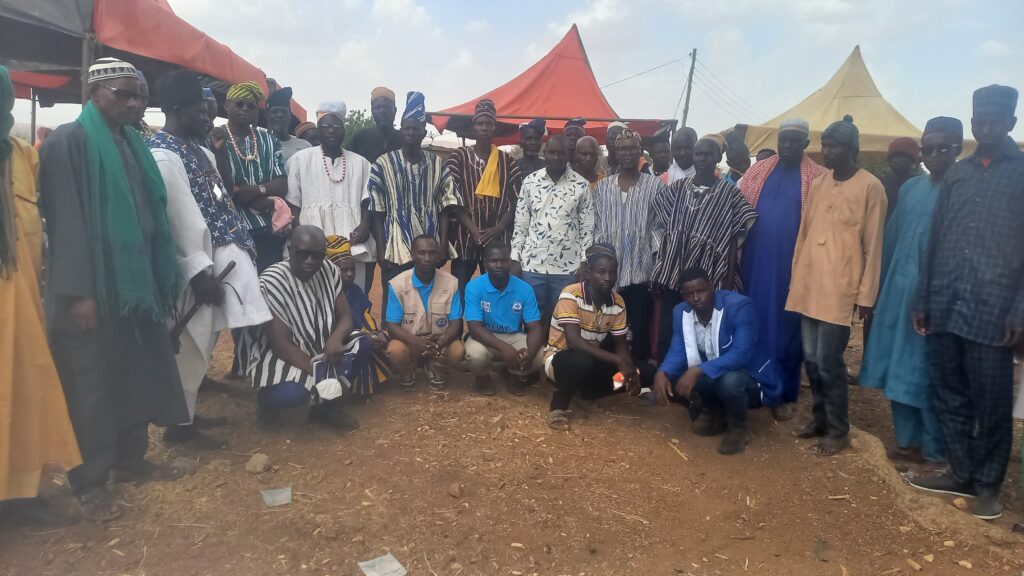|
Getting your Trinity Audio player ready...
|
A project, aimed to foster social cohesion through cross-cultural integration, has inured farmers in Widnaba and Fulbe herders embracing peaceful coexistence in the Upper East Region.The change is attributed to an intervention dubbed: “Support Project for the Strengthening of Social Cohesion at the Level of Strategic Cross-Border Territories (PARCS Project),” implemented by Changing Lives in Innovative Partnerships (CLIP), a Non-Governmental Organisation operating in eight border districts of Northern Ghana.The project is funded by the Agence Française de Développement (AFD) through Acting for Life (AFL), an NGO.
In the past few years, Ghana’s border communities, particularly those in the Upper East Region, have witnessed an influx of foreign nationals from the Sahelian region.Instability in the Sahel region, including Burkina Faso, Niger, and Mali, coupled with recent political unrest and the activities of violent extremists in some of those countries, compelled many people to move southward, especially into Ghana.
Environmental factors such as prolonged drought and erratic rainfall, caused by desertification and climate change, have reduced the availability of grazing lands and water resources therefore forcing many people, particularly herdsmen, to migrate with their animals to settle in various border communities in Ghana.One such community is Widnaba in the Bawku West District of the Upper East Region, where herders, mostly from the Fulbe community, have settled among the predominantly farming indigenous Kusaasi people.
As a result of competition for scarce natural resources, particularly grazing land and water, there have been recurring conflicts over the years. The situation worsened when stray animals belonging to the herders destroyed farmers’ crops.These farmer-herder conflicts, which affect many communities across Northern Ghana, have led to the loss of several lives and destruction of property.
However, in Widnaba, the story has taken a positive turn where the indigenous (Kusaasis), who are mostly crop farmers, are living peacefully now with other groups, particularly the Fulbe herders who have settled in the community with their cattle.As part of the project, an intercultural celebration was held in Widnaba, bringing together the indigenous people and the Fulbe community to promote unity and strengthen social cohesion between the two groups.According to Mr Sayibu Sulemana Wumbei, PARCS Project Officer at CLIP, the organization’s core principle has always been to promote peace and coexistence in their operational communities so that development initiatives can thrive.
He acknowledged the pressure asylum seekers, particularly herders, placed on host communities and explained that the PARCS project aimed to build the resilience of these communities, helping them to coexist peacefully with the asylum seekers despite the strain on limited resources such as land, water, education, health, and other social amenities.Mr Wumbei noted that a dialogue platform and conflict resolution committee comprising representatives from both the indigenous and Fulbe communities have been established to address any disputes that may arise.He added that the project has empowered both groups with knowledge and skills to resolve their differences locally and to strengthen social cohesion.He also explained that the intercultural celebration was organized to help participants share their cultural traits, with the aim of fostering mutual appreciation and peaceful living.“Even now, there are intermarriages among them, and peace has been restored. We are now looking at bringing development projects to the community,” he said.
Mr Karim Apotam, Spokesperson for the Divisional Chief of Widnaba, Naba Amalting Paul Apotam III, noted that the community, especially the farmers, were living peacefully with the Fulbe community due to dialogue sessions facilitated by the project.“The project has brought a lasting solution to the conflict between the farmers and the Fulbe. There is now rapport between them, and we are appealing to CLIP to continue supporting the community,” he said.
Shaibu Aju, a leader of the Fulbe community in Widnaba, praised the project, saying it has helped to resolve the recurrent conflicts and foster peaceful coexistence.
Mr Job Nyaaba Akpelimtera, Assemblyman for the Widnaba Electoral Area, noted that to strengthen the peace, there was the need for the government and other NGOs to help provide alternative livelihoods for the youth of the area. Mr Alhassan Ahmed, the Bawku West District Coordinating Director, also commended CLIP for its intervention, stating that the initiative complements the work of the Assembly in promoting social cohesion.
Source: GNA


